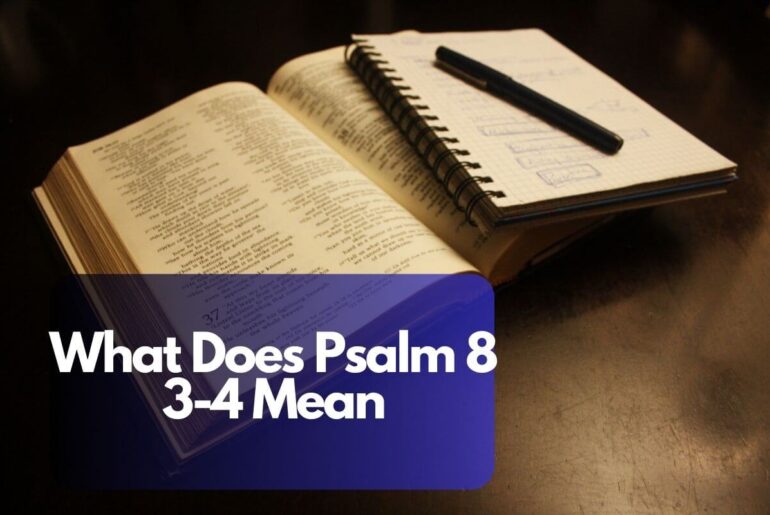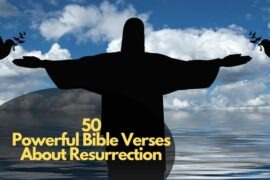Psalm 8, specifically verses 3-4, is a passage that holds profound meaning and significance. These verses invite us to contemplate the majesty of God’s creation and the special place that humanity occupies within it. In this article, we will delve into the deeper meaning of Psalm 8 verses 3-4, exploring the poetic language and symbolic imagery used by the psalmist. We will uncover the themes of God’s glory, the marvel of creation, and the unique role entrusted to humanity as stewards of the earth. Through thoughtful analysis, we aim to gain a deeper understanding of the spiritual insights and truths conveyed in these verses.
Contents
What Does Psalm 8:3-4 Mean
Psalm 8 verses 3-4, within the book of Psalms, are a testament to the profound significance and poetic beauty found in Scripture. These verses capture the awe-inspiring contemplation of the psalmist as they gaze upon the heavens and reflect on the majesty of God’s creation.
The purpose of this article is to delve into the meaning and symbolism contained in Psalm 8 verses 3-4, unlocking the deeper layers of understanding and spiritual insight they offer. By exploring the language and imagery used, we can gain a richer appreciation of the psalmist’s message and its relevance to our lives today.
In this exploration, we will examine themes such as the grandeur of the cosmos, the divine handiwork displayed in creation, and the unique position of humanity within God’s expansive universe. By understanding these themes, we can gain a deeper understanding of our place in the world and our relationship with the Creator. Through our exploration, we will discover the profound wisdom and spiritual significance embedded in these seemingly simple verses.
Context And Background
The Book of Psalms, known as the Psalter, is a collection of poetic and lyrical songs found in the Bible. It is attributed to various authors, including King David and other musicians and prophets. The Psalms cover a wide range of themes, emotions, and expressions of faith, serving as a hymnal and prayer book for the ancient Israelites.
Psalm 8 is a hymn of praise that magnifies the greatness of God and reflects on the wonders of His creation. It explores the majesty of the heavens, the moon and stars, and the awe-inspiring power of the Creator. The psalmist contemplates the significance of humanity in relation to this vast and magnificent universe.
Understanding the historical and cultural context of Psalm 8 helps us appreciate the psalmist’s perspective. It is believed to have been written during a time when the Israelites had a deep reverence for the natural world and recognized their dependence on God’s provision. The psalmist’s words reflect an understanding of the cosmic order and the role of humanity within it. This context enriches our understanding of the themes and messages conveyed in verses 3-4.
Analyzing Psalm 8:3-4
Let’s break down the verses line by line to delve into their imagery and symbolism. In verse 3, the psalmist exclaims, “When I consider your heavens, the work of your fingers, the moon and the stars, which you have set in place.” Here, the psalmist invites us to join them in contemplating the splendor of the heavens and celestial bodies.
The phrase “the heavens” encompasses the vast expanse of the sky, representing the grandeur and magnificence of God’s creation. The mention of “the moon and the stars” highlights the celestial bodies that adorn the night sky, evoking a sense of wonder and awe. By acknowledging that God has “set them in place,” the psalmist acknowledges God’s sovereignty and power as the Creator and Sustainer of the universe.
These verses prompt us to reflect on the significance of humanity’s position within the created world. The juxtaposition of the divine craftsmanship seen in the heavens and the recognition of humanity’s humble existence suggests a profound contrast. Despite our smallness and insignificance in comparison to the vastness of the universe, God has bestowed upon us a unique dignity and purpose.
The psalmist’s contemplation of the heavens prompts them to ponder why God would pay attention to humanity, described as “mere mortals” or “the son of man” in some translations, in verse 4. This raises questions about the divine intention behind the creation of humanity and the responsibility entrusted to us as stewards of God’s creation.
By exploring these themes, Psalm 8:3-4 invites us to marvel at the wonders of God’s handiwork, humbly acknowledging our place in the cosmos, and considering the significance of our relationship with both the Creator and the created world.
Theological And Spiritual Insights
Psalm 8:3-4 holds profound theological implications regarding God’s sovereignty and creation. It reminds us of God’s immense power and creative ability. The psalmist’s contemplation of the heavens underscores the recognition that everything in the universe is the result of God’s intentional design and craftsmanship. It reaffirms God’s role as the ultimate Creator and sustainer of all things, highlighting His authority and dominion over the entire cosmos.
The psalmist’s response of awe and humility before God’s creation is a significant spiritual insight in these verses. By considering the vastness of the heavens, the moon, and the stars, the psalmist is filled with wonder and recognizes their own smallness in comparison. This humility before the majesty of God’s creation cultivates a sense of reverence and deepens their spiritual connection with the Creator.
Psalm 8:3-4 also raises important themes of human dignity, purpose, and responsibility. Despite humanity’s seemingly insignificant stature in the grand scheme of the universe, the psalmist acknowledges that God has crowned us with glory and honor (verse 5). This recognition of our inherent worth and value speaks to the divine intention behind our creation. It reminds us that we are not mere accidents or random beings but purposefully designed by God.
Furthermore, these verses prompt us to reflect on the responsibility entrusted to humanity as stewards of God’s creation. As God’s cherished creation, we are called to care for and responsibly manage the earth and its resources. The psalmist’s contemplation invites us to consider the implications of our actions and choices, encouraging us to fulfill our role in nurturing and preserving the world God has entrusted to us.
In summary, Psalm 8:3-4 offers theological and spiritual insights into God’s sovereignty, human humility, dignity, purpose, and responsibility. It invites us to marvel at the grandeur of God’s creation, humbly acknowledging our place in it, and embracing our unique calling to live in harmony with both the Creator and His creation.
Interpretation and Application
Psalm 8:3-4 has been subject to various interpretations by biblical scholars and theologians throughout history. Some view these verses as a reflection on the cosmic expanse that highlights God’s power and glory. Others see them as a poetic expression of humanity’s unique place in the created order, with the celestial bodies serving as witnesses to God’s handiwork. Exploring different interpretations can deepen our understanding of the text and open up new perspectives.
The application of Psalm 8:3-4 to our lives and spirituality today is multifaceted. Firstly, it invites us to cultivate a sense of awe and wonder in the presence of God’s creation. By contemplating the vastness of the universe and the intricate details of nature, we can develop a deeper appreciation for God’s handiwork and enter into a posture of worship and gratitude.
Secondly, these verses call us to embrace our own dignity as beings created in the image of God. Recognizing our inherent worth and value, we are invited to live with a sense of purpose, acknowledging our role as co-creators and stewards of God’s world. This involves actively engaging in acts of care, compassion, and justice towards both the natural world and our fellow human beings.
To cultivate a sense of awe and stewardship towards God’s creation, we can take practical steps. Spending time in nature, observing its beauty, and reflecting on its intricate design can deepen our connection with the Creator. Engaging in sustainable practices that minimize harm to the environment demonstrates our commitment to stewardship. Additionally, participating in community efforts and initiatives that promote environmental conservation and restoration can have a broader impact.
Furthermore, we can integrate the themes of Psalm 8:3-4 into our spiritual practices. Incorporating moments of reflection and gratitude for the wonders of creation into our prayers and worship can help foster a deeper sense of connection with God. By living in harmony with God’s creation and valuing the inherent worth of every person, we embody the principles found in these verses and contribute to the flourishing of both humanity and the natural world.
Conclusion
Throughout this article, we have explored the meaning and significance of Psalm 8 verses 3-4. We analyzed the imagery and symbolism present in the text, reflected on theological and spiritual insights, and considered different interpretations from biblical scholars.
These verses remind us of the awe-inspiring nature of God’s creation. The vastness of the heavens, the moon, and the stars serve as a testament to God’s power and glory. Simultaneously, the psalmist acknowledges humanity’s unique position within this grandeur, highlighting our role as stewards and co-creators.
As we conclude, let us take a moment to reflect on the psalmist’s words and embrace a deeper appreciation for God’s handiwork in the world. May we be filled with awe and wonder, recognizing the dignity and responsibility entrusted to us. Let us strive to live in harmony with God’s creation, cultivating a sense of gratitude and actively engaging in practices that honor and care for the world around us.
In doing so, we not only draw closer to the Creator but also contribute to the ongoing work of restoration and flourishing. May Psalm 8 verses 3-4 inspire us to contemplate the magnificence of God’s creation and embrace our role within it, living in harmony with all that God has made.








